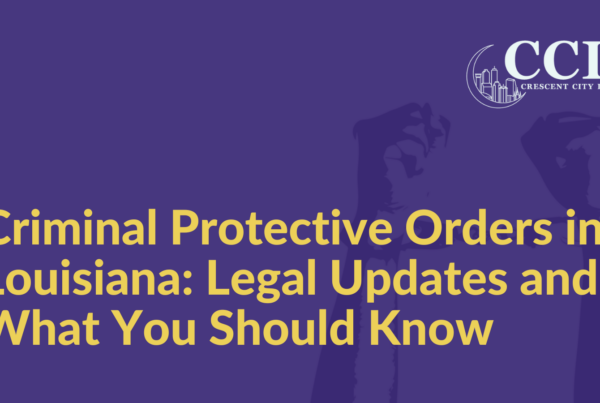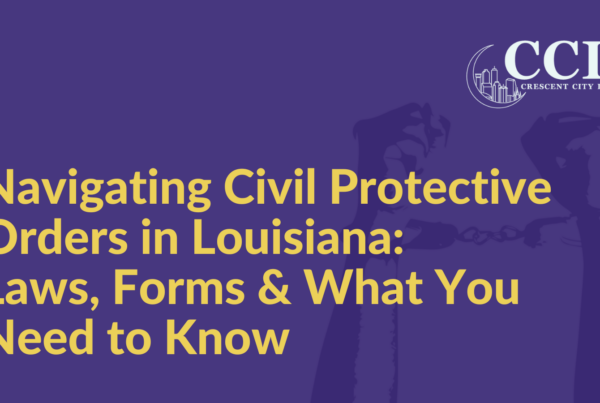If you’ve been charged with a crime in Louisiana, an arraignment is one of the first court proceedings you’ll face. This process can be intimidating, especially if it’s your first encounter with the legal system. Understanding what to expect can ease your concerns and help you make better decisions about your defense.
At Crescent City Law, we understand how overwhelming legal issues can feel, especially when navigating the complexities of the Louisiana criminal justice system. With years of experience representing individuals in New Orleans and across Louisiana, our dedicated team of criminal defense attorneys, led by advocate John Radziewicz, is committed to providing compassionate, client-centered representation.
What Is an Arraignment?
An arraignment is a formal court hearing where you are officially informed of the charges filed against you. It’s the first significant step in Louisiana’s criminal justice process and lays the groundwork for how your case will proceed. So, what happens during an arraignment?
What to Expect at an Arraignment in Louisiana?
Understanding what happens during an arraignment can help you feel more prepared. Here’s a breakdown of the process:
1. Courtroom Procedures
You will appear before a judge, often alongside other defendants scheduled for arraignment. The judge will ensure you understand the charges and your rights. If you haven’t secured legal representation, the judge may appoint a public defender or allow time to hire a private attorney.
2. Entering a Plea
Your plea – or your formal response to a criminal charge in court – will determine the next steps:
- Not Guilty: The case proceeds to pretrial hearings and potentially a trial.
- Guilty: This may result in immediate sentencing or a scheduled sentencing hearing.
- No Contest: This plea functions like a guilty plea but avoids admitting liability in related civil cases.
An attorney can guide you through this critical decision, helping you avoid unintended legal consequences.
3. Bail or Release Conditions
- Setting a bail amount
- Releasing you on your own recognizance (no bail required)
- Imposing conditions like attending court dates or avoiding specific individuals
According to Louisiana Revised Statutes §15:533, bail terms should be fair, considering the severity of the charges and your criminal history. Your attorney can advocate for lower bail or alternative release options, helping you avoid unnecessary time in custody.
How Long Does an Arraignment Take in Louisiana?
While not every case needs to go to trial, an arraignment typically lasts less than 30 minutes, though complex cases or crowded court dockets can cause delays. Being well-prepared and having legal representation can streamline the process.
Our attorneys at Crescent City Law can help you prepare for the arraignment, making the process smoother and more efficient.
Why Is the Arraignment Important?
An arraignment is a crucial part of the criminal process because it:
- Clarifies the Charges: You’ll gain a clear understanding of the accusations against you.
- Initiates the Legal Process: It officially starts your case and sets the legal timeline.
- Sets the Tone for Your Defense: Your plea determines whether the case moves forward or enters negotiations.
- Addresses Bail: The judge may set bail, impacting your ability to remain free during the trial process.
How to Prepare for an Arraignment in Louisiana?
Facing an arraignment can be stressful, but preparation can help:
- Consult an Attorney: A lawyer can explain your charges and represent you in court.
- Understand the Charges: Familiarize yourself with the potential penalties and legal implications.
- Gather Important Documents: Bring relevant documents such as court notices, prior records, or bail receipts.
- Arrive Early: Plan for security checks and possible courtroom delays.
- Dress Professionally: Show respect for the court by wearing formal attire.
Consulting a trusted attorney can ensure you are fully prepared, from understanding charges to presenting evidence when necessary.
What Happens After Your Arraignment in Louisiana?
The next steps in your legal process depend on the plea you enter during your arraignment:
- If You Plead Not Guilty: The case moves to pretrial hearings, where your attorney can file motions to dismiss charges or suppress evidence as permitted under Louisiana Code of Criminal Procedure Article 701.
- If You Plead Guilty or No Contest: The judge may impose a sentence immediately or set a sentencing date.
- If Bail Is Denied or Set: You may remain in custody unless you can post bail.
Each outcome involves different legal procedures that can significantly impact the course of your case. Having an attorney by your side ensures you understand what to expect and how to prepare for the next stages of the legal process.
Contact Our Criminal Defense Attorneys at Crescent City Law Today
An arraignment is a critical first step in the Louisiana criminal justice process. Understanding what to expect and having a legal advocate can make all the difference.
At Crescent City Law, we understand how stressful and confusing an arraignment can be. Our dedicated team in Louisiana is ready to guide you through every step, from entering your plea to building a strong defense strategy.
We are proud to stand by our clients every step of the way, answering queries, advocating fiercely for their rights and working tirelessly to achieve the best possible outcomes. Contact us today at 504-264-9492 to schedule an initial consultation.






